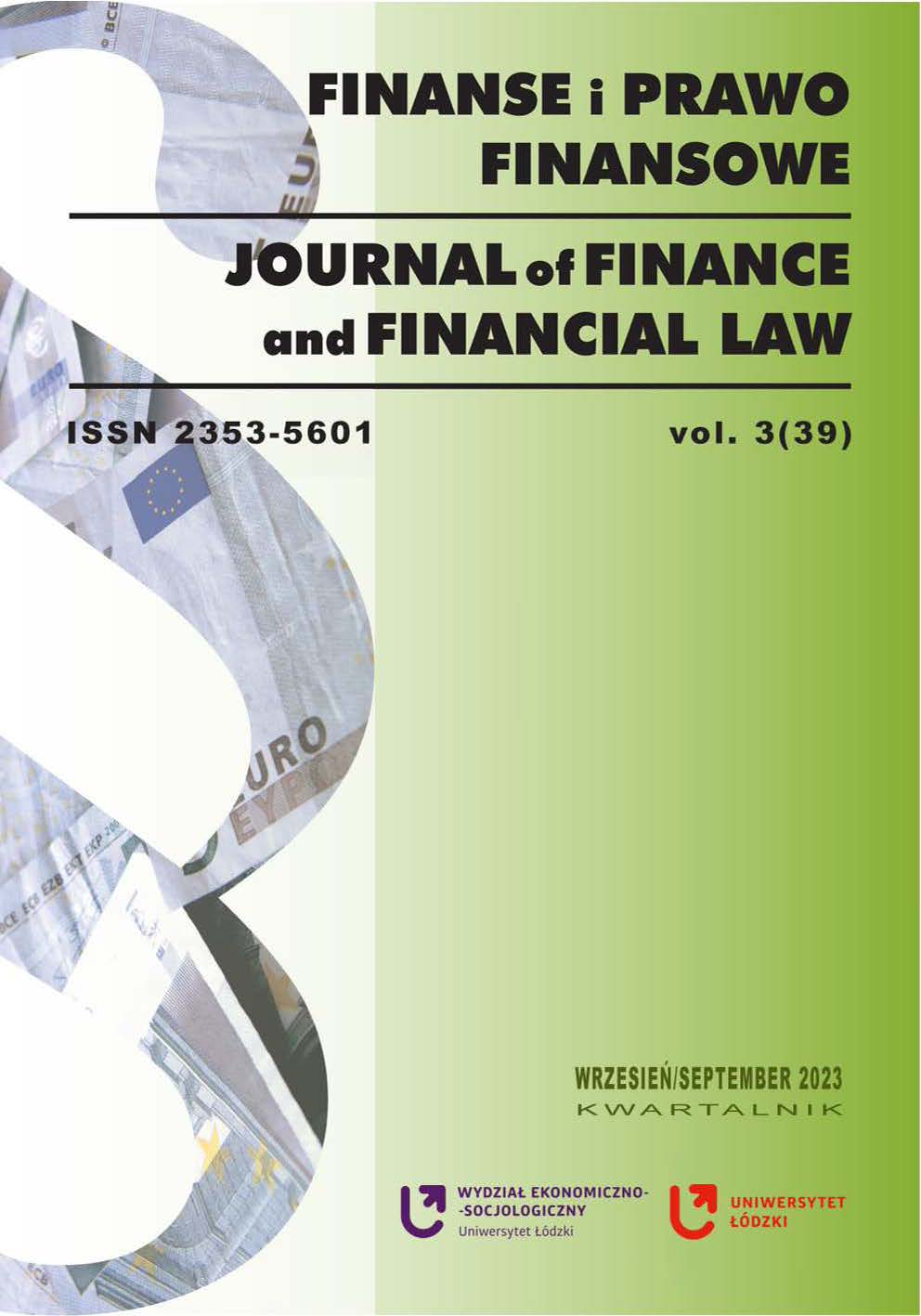Safeguarding Its Way to Security or Not – Should Fintech Become a Bank(Tech)?
DOI:
https://doi.org/10.18778/2391-6478.3.39.04Keywords:
fintech, digital baning, digital innovations, banking licence, banking regulationsAbstract
The purpose of the article. This article explores the trend of fintech firms obtaining banking licenses, challenging their traditional advantage of not being banking institutions. It investigates two hypotheses:
H1 – Banking licenses bring more opportunities than threats for fintech companies;
H2 – Obtaining licenses positively impacts their profitability.
Methodology. The study utilizes the literature review and applies Porter’s Five Forces methodology to assess the strategic implications of banking licenses for fintech firms. Financial analysis is conducted on three selected companies based on market capitalization, banking license timeline, and geographical diversification. Profitability ratios (ROE and ROA) are analyzed before and after obtaining the license.
Results of the research. Fintech firms with banking licenses experience more opportunities than threats, as confirmed by Porter’s analysis. However, only one out of three analysed companies immediately improved profitability ratios after obtaining the license. In conclusion, obtaining banking licenses opens growth opportunities for fintech firms, but immediate profitability improvements are not guaranteed. Additional requirements and challenges arise during the transition to a banking area. The study acknowledges limitations and suggests further research to confirm and expand these findings in the evolving fintech landscape.
Downloads
References
Arner, D.W., Barberis, J., Buckley, R.P. (2015). The Evolution of Fintech: A New Post-Crisis Paradig? Social Science Research Network [Preprint]. https://doi.org/10.2139/ssrn.2676553
Google Scholar
DOI: https://doi.org/10.2139/ssrn.2676553
Bofondi, M., et al. (2018). The Big Promise of Fintech. Social Science Research Network. https://doi.org/10.2139/ssrn.3099337
Google Scholar
Cojoianu, T., et al. (2021). Fin vs. tech: are trust and knowledge creation key ingredients in fintech start-up emergence and financing? Small Business Economics, 57(4). https://doi.org/10.1007/s11187-020-00367-3
Google Scholar
DOI: https://doi.org/10.1007/s11187-020-00367-3
Esposito, M., Tse, T. (2015). From Hubris to Disgrace: The end of Finance as we know it. The World Financial Review, 2.
Google Scholar
Europe’s fintech opportunity (2022). https://www.mckinsey.com/industries/financial-services/our-insights/europes-fintech-opportunity
Google Scholar
Giglio, F. (2021). Fintech: A literature review. European Research Studies Journal, XXIV(2B, 2021).
Google Scholar
DOI: https://doi.org/10.35808/ersj/2254
Goo, J., Heo, J. (2020). The Impact of the Regulatory Sandbox on the Fintech Industry, with a Discussion on the Relation between Regulatory Sandboxes and Open Innovation. Journal of Open Innovation, 6(2). https://doi.org/10.3390/joitmc6020043
Google Scholar
DOI: https://doi.org/10.3390/joitmc6020043
Horváth, D., Kerényi, Á., Szabó, R. (2022). Intended benefits and challenges of cooperation between FinTechs and commercial banks. Acta Oeconomica, 72(3). https://doi.org/10.1556/032.2022.00023
Google Scholar
DOI: https://doi.org/10.1556/032.2022.00023
KPMG (2022) The Netherlands: Europe’s number one fintech hub?. KPMG.com. https://assets.kpmg.com/content/dam/kpmg/nl/pdf/2022/services/the-netherlands-europes-number-1-fintech-hub.pdf
Google Scholar
iTechArt Group, Custom Software Development (2023). The strategy behind fintech acquisitions. https://www.itechart.com/blog/fintech-acquisitions-by-banks/
Google Scholar
Jain, R., et al. (2023). A Systematic Literature Review of the Risk Landscape in Fintech. Risks, 11(2). https://doi.org/10.3390/risks11020036
Google Scholar
DOI: https://doi.org/10.3390/risks11020036
Lumpkin, G.T., et al. (2011). Strategic Management: Text and Cases. McGraw-Hill Education.
Google Scholar
Navaretti, G.B., et al. (2018). Fintech and Banking. Friends or Foes? Social Science Research Network [Preprint]. https://doi.org/10.2139/ssrn.3099337
Google Scholar
DOI: https://doi.org/10.2139/ssrn.3099337
Rajan, R.G. (1992). Insiders and Outsiders: The Choice between Informed and Arm’s-Length Debt. Journal of Finance, 47(4). https://doi.org/10.1111/j.1540-6261.1992.tb04662.x
Google Scholar
DOI: https://doi.org/10.2307/2328944
Rogers, D. (2017). The Rise of FinTech in Supply Chains. Harvard Business Review, 23 June. https://hbr.org/2016/06/the-rise-of-fintech-in-supply-chains
Google Scholar
Sharpe, S.A. (1990). Asymmetric Information, Bank Lending, and Implicit Contracts: A Stylised Model of Customer Relationships. Journal of Finance, 45(4). https://doi.org/10.1111/j.1540-6261.1990.tb02427.x
Google Scholar
DOI: https://doi.org/10.2307/2328715
Schmidt-Jessa, K. (2022). The impact of COVID-19 on digital-only banks: are they winners or losers? Journal of Banking Regulation [Preprint]. https://doi.org/10.1057/s41261-022-00198-0
Google Scholar
DOI: https://doi.org/10.1057/s41261-022-00198-0
Suazo, R. (2023). ABN AMRO’s New10: A fully digital approach to business lending. https://www.bundl.com/articles/examples-abn-new10-digital-approach-to-business-lending
Google Scholar
Varma, P., et al. (2022). Thematic Analysis of Financial Technology (Fintech) Influence on the Banking Industry. Risks, 10(10). https://doi.org/10.3390/risks10100186
Google Scholar
DOI: https://doi.org/10.3390/risks10100186
[www1] https://www.statista.com/statistics/893954/number-fintech-startups-by-region [Accessed 15.03.2023].
Google Scholar
[www2] https://research-methodology.net/square-porters-five-forces-analysis/ [Accessed 15.03.2023].
Google Scholar
[www3] https://courses.cfte.education/ranking-of-largest-fintech-companies/ [Accessed 15.03.2023].
Google Scholar
Downloads
Published
How to Cite
Issue
Section
License

This work is licensed under a Creative Commons Attribution-NonCommercial-NoDerivatives 4.0 International License.














